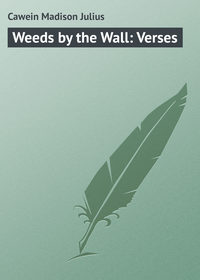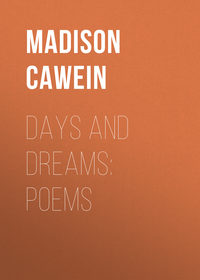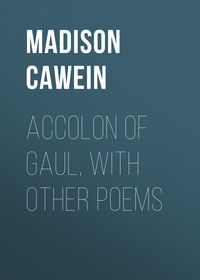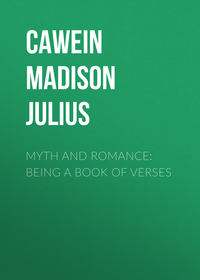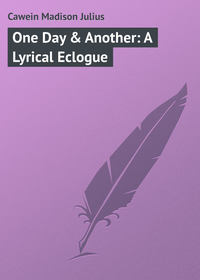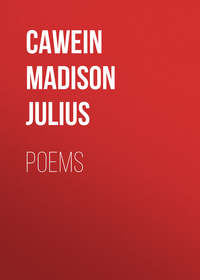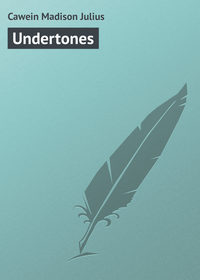The Poems of Madison Cawein. Volume 2 (of 5)
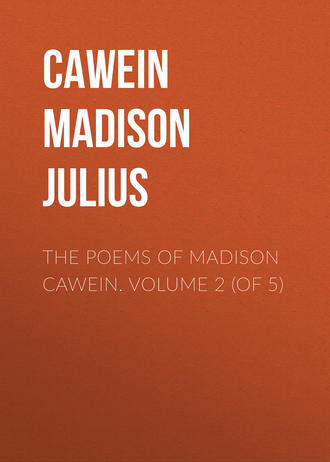 полная версия
полная версияThe Poems of Madison Cawein. Volume 2 (of 5)
Жанр: зарубежная поэзиязарубежная классиказарубежная старинная литературастихи и поэзиясерьезное чтениеcтихи, поэзия
Язык: Английский
Год издания: 2018
Добавлена:
Настройки чтения
Размер шрифта
Высота строк
Поля
II
Parting he said to her: “Let us be true to them,—All of our dreams, of the night, of the morning:What is our present, its hope, but a clew to them?What is our past but a dream and a warning?Have you considered the life that regretfullyFoldeth weak arms to the fate it might master?—Had I been true to my dreams, never fretfullyHalted, my future and joy had been faster.”They had come down to the ocean that, bellowing,Boiled on the sand and the shells that were broken;All of the summer was fading and yellowing;Now they must part and their vows had been spoken.It had befallen that heaven was lowering;Over the sea, like the wraith of a wrecker,Clamored the gull; and the mist in the showeringEast seemed the ghost of a lofty three-decker.Infinite foam; and the boom of the hollowingBreakers that buried the rocks to their shoulders;Battle and boast of the deep in the wallowingWorld of the waves where the red sunset smoulders.Long was the leap of the foam on the thunderousBeach; and each end of the beach was a flyingFog of the spray: and she said, “Let it sunder us!Still we will love, for love is undying!”Yet, if it comes to the thing he has said to her?—Wreckage and death?—the love she has givenTurned into sorrow?—Oh, that was a dread to her!He, like a weed, by the waters far driven!Weeping, her bosom with shudders was shaken asShe for a moment hard clung to her sailor,Kissed him and—parted. His boat had been taken; asPaler it grew the woman grew paler.III
All day the rain drove, fallingUpon the sombre sea;All day, his wet sail hauling,The sailor tacked a-lea;And through the wild rain calling,What was it?—was it he?At dusk the gull clanged, driftingAbove the boiling brine;And, through the wan west sifting,Streamed one red sunset line;And in its wild light shifting,His far sail seemed to shine.All night the wind wailed, sighingAlong the wreck-strewn coast;All night the surf, defying,Rolled thunder in and boast;All night she heard a crying—The sea? or some lost ghost?IV
The balm of the night and the glory,The music and scent of the sea,Are as song to her heart or a storyOf the never-to-be.The stars and the night and the whitenessOf foam on the stretch of the sand;Faint foam that is tossed, like the brightnessOf a mermaiden’s hand.No sail on the ocean; no sailorOn shore, and the winds all asleep;And her face in the starlight far palerThan women who weep.A mist on the deep; and the ghostlyWhite moon in the deep of the night;And a light that is neither; that mostlyIs shadow not light.No sea-gull, that vanished with gleamingOf wings, in the swing of the spray;Perhaps it was only her dreaming,Or merely a rayOf moonlight; the glimmering essenceOf all that is grayest and dim—But never his face, or his presenceThat dripped in each limb.And she cried through the night, “Let perish!O God, let me die of despair!If he whom I love, whom I cherish,Is weltering there!”She seemed but a sea-mist made woman,And he but a sound of the seaMade man where nothing was human,And never would be.V
Long he sailed the deep that glassesThe face of God and His majesty;Passed the Horn and the Seas of Grasses,Drifting aimlessly.Time went by with its days that everBurden the hearts of those who beFar away from their love; whom severLeagues of the shapeless sea.Land at last, whose reefs rolled brokenFoam of the balked waves everywhere;Land; one tangle of weeds and oakenWreck and of rocks laid bare.Here and there the sand stretched lividLeagues of famine, one blinding glare;Crags, o’er which gaunt birds winged vivid,Harsh in the earthquake air.A little cloud in the sunset’s splendor;A little cloud that the sunset stains:Night, and a wisp of a moon that, slender,Dreams of the hurricanes.Winds that stride as with sounding sandals;Winds that the tempest has loosed from chains:Light that leaps like a spear he handles,Shaking his thunder-manes.Wrenching the world in wreck asunder,Black rebellion of hell and night;Wrath and roar of the rocks and thunder,Flame and the winds that fight …Beating the drift and the hush together,Waves and winds that the morn makes white;Calm and peace of the tropic weatherAfter the typhoon’s might.Clouds blow by and the storm’s forgotten.Savage coasts where the sea-cow feeds.Wash of weeds and the sea-weeds rotten.And a dead face in the weeds.None to know him or name him brother;Only the savage in feathers and beads;The South-Sea Islander, fitting anotherBarb in the shaft he speeds.Far away where the sea-gulls gather;Far away where the evening falls,Lone she stands where the wild waves lather,Rolling the sea in walls.—Who shall tell her, the lonely tryster?Tell her of him on whom she calls?—Suns that beat on his face and blister?Stars? or the sea that crawls?VI
She dreamed that there, beside the ocean sitting,Alone she watched, when, at her feet, behold!Between the foam-ridge and the sea-gull’s flitting,His body rolled.All was not as it was before they parted;She dreamed he had remembered, she forgot;He ’d said he would forget her, angry-hearted,And yet could not.And then it seemed that, had she known, she surelyHad given pity when she could not giveHer love to him, who loved her madly, purely,And bade him live.And then she dreamed she looked upon the slantedHulk of a wreck: and high above the wave,Worn of the wind and of the cactus planted,His nameless grave.SIREN SANDS
I
The rhododendrons bloom and shakeTheir petals wide and gleam and swayAmong palmettoes, by the lake,Beyond the bay.Shores where we watched the eve revealHer cloudy sanctuaries, whileThe bay lay lavaed into steelFor mile on mile.We watched the purple coast confuseSoft outlines with the graying light;And towards the gulf a vessel loseItself in night.We saw the sea-gulls dip and soar;The wild-fowl gather past the pier;And from rich skies, as from God’s door,Gold far and near.Two foreign seamen passed and weHeard mellow Spanish; like twin stars,Where they lounged smoking, we could seeTheir faint cigars.Night; and the heavens stained and strewnWith stars the waters idealized,Until their light the rising moonEpitomized.Morn; and the pine-wood balms awake;Winds roll the dew-drop from the rose;The wide lake burns; and, on the lake,The ripple glows.Far coasts detach deep purple fromThe blue horizon, and the dayBeholds the sunburnt sailor comeAnd sail away.The bird that slept at dusk, at dawnAwakes again within the thorn.—Sweet was the night to it, now gone;And sweet is morn.II
Through halls of columned scarlet,Like some dark queen, the DuskTrails skirts of myrrh and musk,Hung in each ear, a starletGleams,—gems the clouds’ gaunt JinnGuard; and, beneath her chin,The moon, an opal tusk.There lies a ghostly gloryUpon the sea and sand;A gleam, as of a hand,Stretched from the realms of story,Of rosy golden ray;Pointing the world the wayTo some far Fairyland.As fades the west’s vermilionAbove the distant coasts,The stars come out in hosts;Within the night’s pavilion,As flower speaks to flower,Dim hour calls to hour,Pale with the past’s sweet ghosts.III
Music that melts through moonlight,Faint on the summer breeze;Fireflies, moonlight, and foamingSusurrus of the seas.Music that drifts like perfume,And touches like a hand;Dreams and stars and the ocean,And we alone on the sand.Glimmers and vague reflections,And the white swirl of the foam;Pale on the purple a vessel,And a light that beckons home.And I seem to see the music,On a moonbeam bar that floats,For the music is moonlight magic,And the flies are its golden notes.And I seem to hear one singingOf a brown old coast and sea,Of lives that were filled with passion,And old-world tragedy.And I hear the harsh reef’s callingFor a noble ship at sea,And the winds of the ocean singingA dirge for the dead to be.Till it seems that I am the pilot,And you are the mermaidén,Who lures him on to the wreckingAnd into her arms again.SongOver the hills where the winds are wakingAll is lone as the soul of me;Over the hills where the stars are shaking,Breton hills by the sea.These were with me to tell me oftenHow she pined in her Croisic home,Winds that sing and the stars that softenOver the miles of foam.Fishers’ nets and the sailor faces;Sad salt marshes and granite piers;Brown, loud coast where the long foam races—And a parting full of tears.A gray sail’s ghost where the autumn lies onWraiths of the mist and the squall-blown rain;Her dark girl eyes that search the horizon,Grave with a haunting pain.Stars may burn and the wild winds whistleOver the rocks where the sea-gulls rave—My heart is bleak as the wind-worn thistleon her seaside grave.IV
Sad as sad eyes that ache with tearsThe stars of night shine through the leaves;And shadowy as the Fates’ dim shearsThe weft that twilight weaves.The summer sunset marched long hostsOf gold adown one golden peak,That flamed and fell; and now gray ghostsOf mist the far west streak.They seem the shades of things that weep,Wan things the heavens would conceal;Blood-stained; that bear within them, deep,Red wounds that will not heal.Night comes, and with it storm, that slipsWild angles of the jagged light:—I feel the wild rain on my lips,—A wild girl is the Night.A moaning tremor sweeps the trees;And all the stars are packed with death:—She holds me by the neck and knees,I feel her wild, wet breath.Hell and its hags drive on the rain:—Night holds me by the hair and pleads;Her kisses fall like blows again;My brow is dewed with beads.The thunder plants wild beacons onEach volleying height.—My soul seems blownFar out to sea. The world is gone,And night and I alone.Tampa, Florida, February, 1893.WAR-TIME SILHOUETTES
I
THE BATTLEThe night had passed. The day had come,Bright-born, into a cloudless sky:We heard the rolling of the drum,And saw the war-flags fly.And noon had crowded upon mornEre Conflict shook her red locks far,And blew her brazen battle-hornUpon the hills of War.Noon darkened into dusk—one blotOf nightmare lit with hell-born suns;—We heard the scream of shell and shotAnd booming of the guns.On batteries of belching grapeWe saw the thundering cavalryHurl headlong,—iron shape on shape,—With shout and bugle-cry.When dusk had moaned and died, and nightCame on, wind-swept and wild with rain,We slept, ’mid many a bivouac light,And vast fields heaped with slain.II
IN HOSPITALWounded to death he lay and dreamedThe drums of battle beat afar,And round the roaring trenches screamedThe hell of war.Then woke; and, weeping, spoke one wordTo the kind nurse who bent above;Then in the whitewashed ward was heardA song of love.The song she sang him when she gaveThe portrait that he kissed; then sighed,“Lay it beside me in the grave!”And smiled and died.III
THE SOLDIER’S RETURNA brown wing beat the apple leaves and shookSome blossoms on her hair. Then, note on note,The bird’s wild music bubbled. In her book,Her old romance, she seemed to read. No lookBetrayed the tumult in her trembling throat.The thrush sang on. A dreamy wind came downFrom one white cloud of afternoon and fannedThe dropping petals on her book and gown,And touched her hair, whose braids of quiet brownGently she smoothed with one white jeweled hand.Then, with her soul, it seemed, from feet to browShe felt him coming: ’t was his heart, his breathThat stirred the blossom on the apple bough;His step the wood-thrush warbled to. And nowHer cheek went crimson, now as white as death.Then on the dappled page his shadow—yes,Not unexpected, yet her haste assumedFright’s startle; and low laughter did confessHis presence there, soft with his soul’s caressAnd happy manhood, where the rambo bloomed.Quickly she rose and all her gladness sentWild welcome to him. Her his unhurt armDrew unresisted; and the soldier leantFond lips to hers. She wept. And so they wentDeep in the orchard towards the old brick farm.IV
THE APPARITIONA day of drought, foreboding rain and wind,As if stern heaven, feeling earth had sinned,Frowned all its hatred. When the evening came,Along the west, from bank on bank unthinnedOf clouds, the storm unfurled its oriflamme.Then lightning signaled, and the thunder wokeIts monster drums, and all God’s torrents broke.—She saw the wild night when the dark pane flashed;Heard, where she stood, the disemboweled oakRoar into fragments when the welkin crashed.Long had she waited for a word. And, lo!Anticipation still would not say “No:”He has not written; he will come to her;At dawn!—to-night!—Her heart hath told her so;And so expectancy and love aver.She seems to hear his fingers on the pane—The glass is blurred, she can not see for rain:Is that his horse?—the wind is never still:And that his cloak?—ah, surely that is plain!—A torn vine tossing at the window-sill.She hurries forth to meet him; pale and wet,She sees his face; the war-soiled epaulet;A sabre-scar that bleeds from brow to cheek;And now he smiles, and now their lips have met,And now … Dear heart, he fell at Cedar Creek!V
WOUNDED
It was in August that they brought her newsOf his bad wounds; the leg that he must lose.And August passed, and when October raisedRed rebel standards on the hills that blazed,They brought a haggard wreck; she scarce knew whose,Until they told her, standing stunned and dazed.A shattered shadow of the stalwart lad,The five-months husband, whom his country hadEnlisted, strong for war; returning this,Whose broken countenance she feared to kiss,While health’s remembrance stood beside him sad,And grieved for that which was no longer his.They brought him on a litter; and the dayWas bright and beautiful. It seemed that MayIn woodland rambles had forgot her pathOf season, and, disrobing for a bath,By the autumnal waters of some bay,With her white nakedness had conquered Wrath.Far otherwise she wished it: wind and rain;The sky, one gray commiserative pain;Sleet, and the stormy drift of frantic leaves;To match the misery that each perceivesAches in her hand-clutched bosom, and is plainIn eyes and mouth and all her form that grieves.Theirs, a mute meeting of the lips; she stoopedAnd kissed him once: one long, dark side-lock droopedAnd brushed against the bandage of his breast;With feeble hands he held it and caressed;Then all his happiness in one look grouped,Saying, “Now I am home, I crave but rest.”Once it was love! but then the battle killedAll that sweet nonsense of his youth, and filledHis heart with sterner passion.—Ah, well! peaceMust balm its pain with patience; whose surceaseMeans reconcilement; e’en as God hath willed,With war or peace who shapes His ends at ease.—What else for these but, where their mortal lotOf weak existence drags rent ends, to knotThe frail unravel up!—while love (afraidTime will increase the burthen on it laid),Seeks consolation, that consoleth not,In toil and prayer, waiting what none evade.VI
THE MESSAGELong shadows toward the east: and in the westA blaze of garnet sunset, wherein rolledOne cloud like some great gnarly log of gold;Each gabled casement of the farm seemed dressedIn ghosts of roses blossoming manifest.And she had brought his letter there to read,There on the porch, that faced the locust glade;To watch the summer sunset burn and fade,And breathe the twilight scent of wood and weed,Forget all care and her soul’s hunger feed.And on his face her fancy mused a while:“Dark hair, dark eyes.—And now he has a beardDark as his hair.”—She smiled; yet almost fearedIt changed him so she could not reconcileHer heart to that which hid his lips and smile.Then tried to feature, but could only seeThe beardless man who bent to her and kissedHer and their child and left them to enlist:She heard his horse grind in the gravel: heWaved them adieu and rode to fight with Lee.Now all around her drowsed the hushful humOf evening insects. And his letter spokeOf love and longings to her: nor awokeOne echo of the bugle and the drum,But all their future in one kiss did sum.The stars were thick now; and the western blushDrained into darkness. With a dreamy sighShe rocked her chair.—It must have been the cryOf infancy that made her rise and rushTo where their child slept, and to hug andhush.Then she returned. But now her ease was gone.She knew not what, she felt an unknown fearPress, tightening, at her heart-strings; then a tearScalded her eyelids, and her cheeks grew wanAs helpless sorrow’s, and her white lips drawn.With stony eyes she grieved against the skies,A slow, dull, aching agony that knewFew tears, and saw no answer shining toHer silent questions in the stars’ still eyes“Where Peace delays and where her soldier lies.”They could have told her. Peace was far away,Beyond the field that belched black batteriesAll the red day. ’Mid picket silences,On woodland mosses, in a suit of gray,Shot through the heart, he by his rifle lay.VII
THE WOMAN ON THE HILLThe storm-red sun, through wrecks of wind and rain,And dead leaves driven from the frantic boughs,Where, on the hill-top, stood a gaunt, gray house,Flashed wildest ruby on each rainy pane.Then woods grew darker than unburdened grief;And, crimson through the woodland’s ruin, streamedThe sunset’s glare—a furious eye, which seemedWatching the moon rise like a yellow leaf.The rising moon, against which, like despair,High on the hill, a woman, darkly drawn,The wild leaves round her, stood; with features wan,And tattered dress and wind-distracted hair.As still as death, and looking, not through tears,For the young face of one she knows is lost,While in her heart the melancholy frostGathers of all the unforgotten years.What if she heard to-night a hurrying hoof,Wild as the whirling of the withered leaf,Bring her a more immedicable grief,A shattered shape to live beneath her roof!The shadow of him who claimed her once as wife;Her lover!—no!—the wreck of all their pastBrought back from battle!—Better to the lastA broken heart than heartbreak all her life!MOSBY AT HAMILTON
Down Loudon lanes, with swinging reins,And clash of spur and sabre,And bugling of the battle-horn,Six score and eight we rode that morn,Six score and eight of Southern born,All tried in war’s hot labor.Full in the sun, at Hamilton,We met the South’s invaders;Who, over fifteen hundred strong,’Mid blazing homes had marched alongAll night, with Northern shout and song,To crush the rebel raiders.Down Loudon lanes, with streaming manes,We spurred in wild March weather;And all along our war-scarred wayThe graves of Southern heroes lay—Our guide-posts to revenge that day,As we rode grim together.Old tales still tell some miracleOf Saints in holy writing—But who shall say why hundreds fledBefore the few that Mosby led,Unless it was that even the deadFought with us then when fighting.While Yankee cheers still stunned our ears,Of troops at Harper’s Ferry;While Sheridan led on his Huns,And Richmond rocked to roaring guns,We felt the South still had some sonsShe would not scorn to bury.THE FEUD
Rocks, trees and rocks; and down a mossy stoneThe murmuring ooze and trickle of a streamThrough brambles, where the mountain spring lies lone,—A gleaming cairngorm where the shadows dream,—And one wild road winds like a saffron seam.Here sang the thrush, whose pure, mellifluous noteDropped golden sweetness on the fragrant June;Here cat-and blue-bird and wood-sparrow wroteTheir presence on the silence with a tune;And here the fox drank ’neath the mountain moon.Frail ferns and dewy mosses and dark brush,—Impenetrable briers, deep and dense,And wiry bushes;—brush, that seemed to crushThe struggling saplings with its tangle, whenceSprawled out the ramble of an old rail-fence.A wasp buzzed by; and then a butterflyIn orange and amber, like a floating flame;And then a man, hard-eyed and very sly,Gaunt-cheeked and haggard and a little lame,With an old rifle, down the mountain came.He listened, drinking from a flask he tookOut of the ragged pocket of his coat;Then all around him cast a stealthy look;Lay down; and watched an eagle soar and float,His fingers twitching at his hairy throat.The shades grew longer; and each Cumberland heightLoomed, framed in splendors of the dolphin dusk.Around the road a horseman rode in sight;Young, tall, blond-bearded. Silent, grim, and brusque,He in the thicket aimed—Quick, harsh, then husk,The echoes barked among the hills and madeRepeated instants of the shot’s distress.—Then silence—and the trampled bushes swayed:—Then silence, packed with murder and the pressOf distant hoofs that galloped riderless.LYNCHERS
At the moon’s down-going, let it beOn the quarry hill with its one gnarled tree.The red-rock road of the underbrush,Where the woman came through the summer hush.The sumac high and the elder thick,Where we found the stone and the ragged stick.The trampled road of the thicket, fullOf footprints down to the quarry pool.The rocks that ooze with the hue of lead,Where we found her lying stark and dead.The scraggy wood; the negro hut,With its doors and windows locked and shut.A secret signal; a foot’s rough tramp;A knock at the door; a lifted lamp.An oath; a scuffle; a ring of masks;A voice that answers a voice that asks.A group of shadows; the moon’s red fleck;A running noose and a man’s bared neck.A word, a curse, and a shape that swings;The lonely night and a bat’s black wings.At the moon’s down-going, let it beOn the quarry hill with its one gnarled tree.DEAD MAN’S RUN
He rode adown the autumn wood,A man dark-eyed and brown;A mountain girl before him stoodClad in a homespun gown.“To ride this road is death for you!My father waits you there;My father and my brother, too—You know the oath they swear.”He holds her by one berry-brown wrist,And by one berry-brown hand;And he hath laughed at her and kissedHer cheek the sun hath tanned.“The feud is to the death, sweetheart:But forward must I ride.”—“And if you ride to death, sweetheart,My place is by your side.”Low hath he laughed again and kissedAnd helped her with his hand;And they have galloped into the mistThat belts the autumn land.And they had passed by Devil’s Den,And come to Dead Man’s Run,When in the brush rose up two men,Each with a levelled gun.“Down! down! my sister!” cries the one;—She gives the reins a twirl.—The other shouts, “He shot my son!And now he steals my girl!”The rifles crack: she will not wail:He will not cease to ride:But, oh! her face is pale, is pale,And the red blood stains her side.“Sit fast, sit fast by me, sweetheart!The road is rough to ride!”—The road is rough by gulch and bluff,And her hair blows wild and wide.“Sit fast, sit fast by me, sweetheart!The bank is steep to ride!”—The bank is steep for a strong man’s leap,And her eyes are staring wide.“Sit fast, sit fast by me, sweetheart!The Run is swift to ride!”—The Run is swift with mountain drift,And she sways from side to side.Is it a wash of the yellow moss,Or drift of the autumn’s gold,The mountain torrent foams acrossFor the dead pine’s roots to hold?Is it the bark of the sycamore,Or peel of the white birch-tree,The mountaineer on the other shoreHath followed and still can see?No mountain moss or leaves, wild rolled,No bark of birchen-gray!—Young hair of gold and a face death-coldThe wild stream sweeps away.THE RAID
I
Far in the forest, where the rude road windsThrough twisted briers and weeds, stamped down and cakedWith mountain mire, the clashing boughs are rakedAgain with rain whose sobbing frenzy blinds.There is a noise of winds; a gasp and gulpOf swollen torrents; and the sodden smellOf woodland soil, dead trees—that long since fellAmong the moss—red-rotted into pulp.Fogged by the rain, far up the mountain glen,Deep in a cave, an elfish wisp of light;And stealthy shadows stealing through the nightWith strong, set faces of determined men.II
’Twixt fog and fire, in pomps of chrysoprase,Above vague peaks, the morning hesitatesEre, o’er the threshold of her golden gates,Speeds the wild splendor of her chariot’s rays.A gleaming glimmer in the sun-speared mist,A cataract, reverberating, falls:Upon a pine a gray hawk sits and calls,Then soars away no bigger than a fist.Along the wild path, through the oaks and firs,—Rocks, where the rattler coils himself and suns,—Big-booted, belted, and with twinkling guns,The posse marches with its moonshiners.THE BROTHERS


